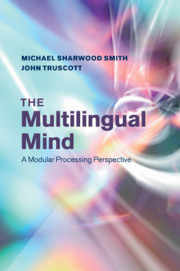
- Cited by 3
-
Cited byCrossref Citations
This Book has been cited by the following publications. This list is generated based on data provided by Crossref.
Truscott, John 2014. Multiple Grammars and MOGUL. Second Language Research, Vol. 30, Issue. 1, p. 75.
VanPatten, Bill 2017. Situating instructed language acquisition. Instructed Second Language Acquisition, Vol. 1, Issue. 1, p. 45.
Natvig, David 2022. Lost in Transmission: The Role of Attrition and Input in Heritage Language Development, edited by Bernhard Brehmer and Jeanine Treffers-Daller. Heritage Language Journal, Vol. 19, Issue. 1, p. 1.
- Publisher:
- Cambridge University Press
- Online publication date:
- January 2014
- Print publication year:
- 2014
- Online ISBN:
- 9781139644044




